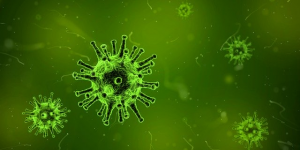
Selenium and selenoproteins have a role to play in the protection of humans against viral infections [Méplan & Hughes 2020].
Viruses and viral infections are scary enough in and of themselves. Witness the effects of the current corona virus pandemic COVID-19.
Even more scary are the effects of nutritional deficiencies such as selenium deficiency on the body’s ability to fight off a viral infection.
Selenium Deficiency Associated with Increased Virulence of Viruses
Low selenium status, defined variously as serum selenium status below 70 micrograms per liter or below 85 micrograms per liter, is associated with the following deleterious effects of viral contagion [Méplan & Hughes 2020]:
- The viral pathogens induce oxidative stress by generating more harmful free radicals. The result is oxidative damage to cells, proteins, and DNA.
- The viral pathogens diminish the cells’ antioxidant defenses including diminishing the activity of the antioxidant seleno-enzymes, e.g. the glutathione peroxidases and the thioredoxin reductases.
- The viral pathogens increase oxidative stress to the extent that it can induce mutations of the genomes of the attacking virus. The result is that the mutated viruses are more virulent than the initial viruses were. This increased virulence of mutated viruses has been seen in both coxsackie viruses and influenza viruses. The consequence of the increased virulence is to make the viruses more dangerous even to people with adequate selenium status.
- The viral pathogens reduce the ability of the immune system to respond to the virus. This reduced immune response to viruses has also been seen in the response of selenium deficient humans to the HIV virus and the hepatitis B and C viruses.
Re selenium deficiency: Bomer et al reported more severe signs and symptoms of heart failure and poorer exercise capacity and poorer quality of life in heart failure patients with serum selenium concentrations below 70 mcg/L. Rayman reported that serum and plasma levels below 85 mcg/L are associated with decreased survival in HIV-infected patients [Bomer 2019; Rayman 2012].
Professor Margaret P. Rayman, University of Surrey, Guildford, UK, indicates in figure 2 of her 2019 article entitled “Selenium intake, status, and health” that a selenium status of approximately 125 mcg/L is a safe and healthy serum selenium concentration [Rayman 2019].
Selenium Status and Immune Response
Avery et al [2019] report the following effects of adequate selenium status on immune response:
- Higher selenium status has a beneficial effect on the proliferation and differentiation of CD4 + T helper cells.
- More information about the effects of selenium levels on cytotoxic CD8 + T cells is needed.
- Selenium levels affect macrophages’ inflammatory signaling capacity and anti-pathogen activities.
- Dietary selenium intakes affect natural killer cell activity directly and indirectly.
- Both innate and adaptive immune responses against bacterial and parasitic infections are dependent upon sufficient selenium status to eliminate the pathogens.
- The antioxidant properties of some selenoproteins contribute to increasing anti-viral immunity.
- The best evidence for a role for selenium in anti-viral immunity is the evidence from HIV infections, which directly impair immunity. Low selenium status is clearly implicated in HIV disease progression. Low selenium intakes have been associated with the prevalence of HIV infection. Furthermore, selenium status in HIV-positive patients has been correlated with the status of CD4+ T cell numbers.
Bottom Line: Selenium and Selenoproteins and Immune System
- Selenium intake and selenium status and the expression of selenoproteins are important factors in the response of the immune system to pathogens.
- Innate and adaptive immune responses are impaired in humans with low selenium status (defined as selenium status less than 85 micrograms per liter).
- Selenium supplementation may be necessary to improve the immune response against pathogens.
- Manipulation of individual selenoproteins may enhance the immune system response and mitigate the effects of chronic inflammation.
Sources
Avery JC, Hoffmann PR. Selenium, Selenoproteins, and Immunity. Nutrients. 2018;10(9):1203. Published 2018 Sep 1. doi:10.3390/nu10091203
Bomer N, Grote Beverborg N, Hoes MF & Streng KW. 2019. Selenium and outcome in heart failure. Eur J Heart Fail; doi:10.1002/ejhf.1644.
Guillin OM, Vindry C, Ohlmann T & Chavatte L. 2019. Selenium, selenoproteins and viral infection. Nutrients; 11(9). pii: E2101.
Méplan C & Hughes DJ. 2020. The Role of selenium in health and disease: emerging and recurring trends. Nutrients; 12(4). pii: E1049.
Rayman MP. 2012. Selenium and human health. Lancet; 379(9822): 1256-68.
Rayman MP. 2019. Selenium intake, status, and health: a complex relationship. Hormones (Athens); 19(1): 9-14.
The information presented in this review article is not intended as medical advice and should not be used as such.
15 May 2020
